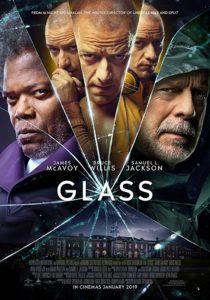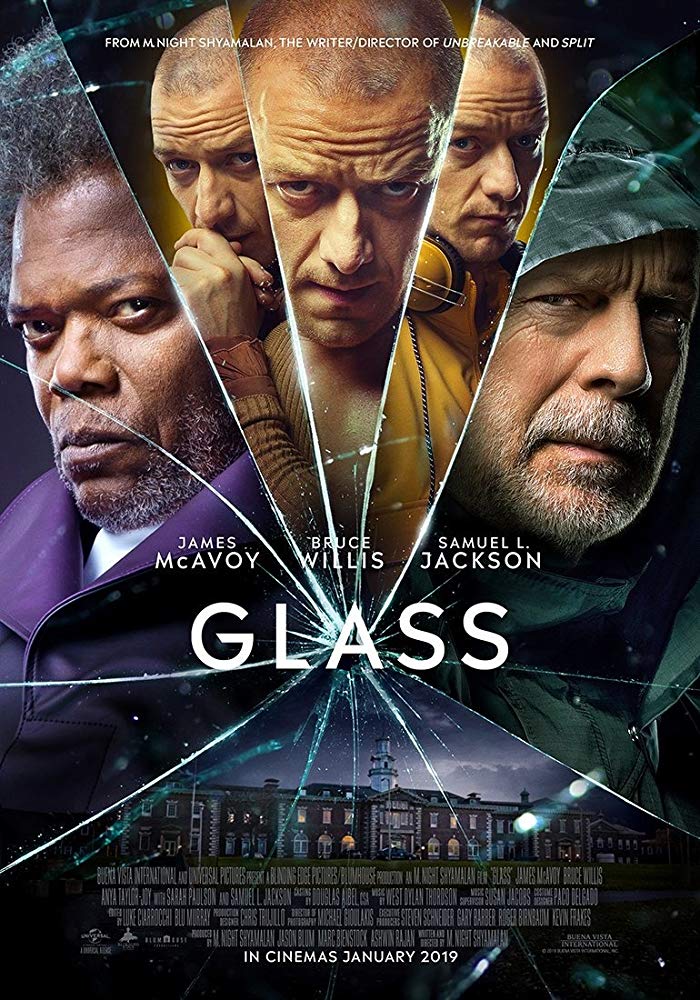 What exactly is a “comic book thriller”? I’m not exactly sure, but apparently Glass falls into that category. So Comic-Con types rejoice! This one’s primarily for you. It’s also a gift of sorts for fans of Unbreakable (2000) and Split (2016), two creepy yet engrossing movies written and directed by M. Night Shyamalan. In Glass, Shyamalan merges the narrative of those two previous efforts to complete what turns out to be a trilogy nearly 20-years in the making, and possibly sets the origin story for a whole new series of comic-horror-thriller-superhero cinematic events.
What exactly is a “comic book thriller”? I’m not exactly sure, but apparently Glass falls into that category. So Comic-Con types rejoice! This one’s primarily for you. It’s also a gift of sorts for fans of Unbreakable (2000) and Split (2016), two creepy yet engrossing movies written and directed by M. Night Shyamalan. In Glass, Shyamalan merges the narrative of those two previous efforts to complete what turns out to be a trilogy nearly 20-years in the making, and possibly sets the origin story for a whole new series of comic-horror-thriller-superhero cinematic events.
Here’s what you need to know, or recall, going into Glass: In Unbreakable, Bruce Willis played David Dunn, the lone survivor of a horrific train crash that left him unscathed, triggering the curiosity of Samuel L. Jackson’s Elijah Price (aka Mr. Glass) who was born with a malady that causes his bones to break at the slightest pressure. The film ends with Dunn as a poncho-wearing vigilante who operates in the shadows, and Price, well (spoiler alert), in an institution for the criminally insane.
In Split, James McAvoy played a guy named Kevin Wendell Crumb who had about two dozen other personalities collectively known as “The Horde” and an emerging superhuman personality called “The Beast.” That film ends with The Beast on the run after a violent rampage and – in a surprise cameo in the final scene – a brush with David Dunn.
Glass puts the whole gang together, along with David’s son (Spencer Treat Clark), Elijah’s mother (Charlayne Woodard) and a tormented young woman who escaped Kevin/The Beast (Anya Taylor-Joy), all reprising their roles. Sarah Paulson joins the fray as a psychiatrist who attempts to “treat” David, Elijah and Kevin for what she claims are their “delusions” of hero grandeur.
I could try and explain or lay out more of the plot but that could spoil things for others (i.e. I haven’t really figured it all out myself). Glass takes you on a fairly slow and quiet ride that does ultimately provide some pay-off as to the origins and conclusions of certain heroes, villains and arch-villains among us. It helped tremendously that I watched Unbreakable on iTunes just hours before Glass. I was able to appreciate tidbits like Shyamalan’s repeat cameo, and the maturation in real time of father-son duo David and Joseph (Willis and Clark). As for Split, I remember being lukewarm on the movie as a whole, but incredibly impressed with McAvoy’s performance(s). That carries through to Glass.
Glass is touted as a culmination of the stories presented in Unbreakable and Split, yet it’s probably my least favorite, mainly because the ending is a bit of a downer. For Shyamalan fans, Glass is likely to come across as flawed but intriguing. For those who don’t particularly care for Shyamalan films and haven’t seen Unbreakable and/or Split, Glass will surely induce plenty of head scratching and bewilderment. Welcome (back) to the world of M. Night Shyamalan.
But first, you might want to see these, in this order:

